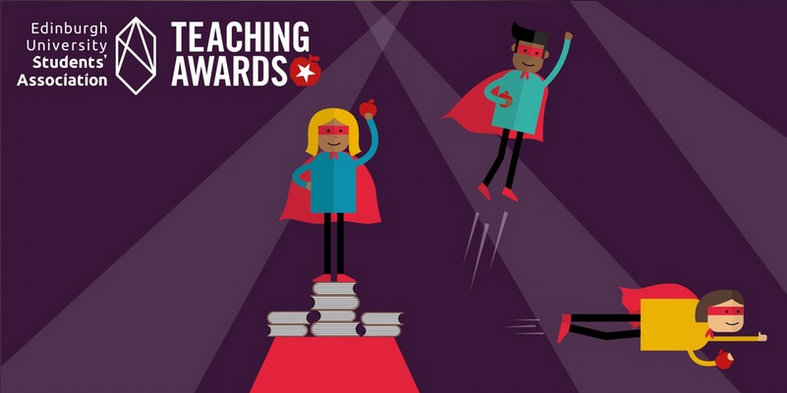 The Edinburgh University Students’ Association Teaching Awards have been running since 2008, providing annual highlights of the contributions that academics, supervisors, student tutors and support staff make to the student experience. Students are encouraged to nominate staff in a variety of categories, ranging from ‘Best Overall Teacher’ to ‘Best Feedback’ to ‘Best Research or Dissertation Supervisor’. The sheer number of student nominations received for the 2014-15 academic year — nearly 3,000 nominations! — is a testament to how much students value the teaching and support that staff provide, and emphasises that the delivery of a course should be prioritised just as much as the content.
The Edinburgh University Students’ Association Teaching Awards have been running since 2008, providing annual highlights of the contributions that academics, supervisors, student tutors and support staff make to the student experience. Students are encouraged to nominate staff in a variety of categories, ranging from ‘Best Overall Teacher’ to ‘Best Feedback’ to ‘Best Research or Dissertation Supervisor’. The sheer number of student nominations received for the 2014-15 academic year — nearly 3,000 nominations! — is a testament to how much students value the teaching and support that staff provide, and emphasises that the delivery of a course should be prioritised just as much as the content.
With support from the Principal’s Teaching Award Scheme (PTAS), Edinburgh University Students’ Association has undertaken extensive research analysing the almost 3,000 Teaching Awards nomination comments received from students in 2014-15. This research provided the Students’ Association with a wealth of information about student perceptions of teaching excellence throughout their educational experience. The full report will be made public at the launch event on 1 December.
This research highlights four overarching themes to students’ responses. Students valued the positive contributions of staff on account of:
- Concerted, visible effort;
- Charisma, personality, and engaging teaching;
- Breaking down student-teacher barriers and encouraging student engagement;
- Consistency and stability of support provided by staff.
Although students clearly recognise the demands placed upon academic staff in terms of their research commitments, the thousands of responses collected from the Teaching Awards reflect the significant weight which students place on learning and teaching. The responses point to the need for Schools to communicate their expectations clearly to both staff and students, ensuring the former are not overworked and the latter are clear about what academic and pastoral support is available to enhance their learning experience.
None of the findings are particularly surprising. Many academics will no doubt feel very familiar with the examples of best practice included in the report. Students recognise how busy academics are, and thus appreciate when academics prioritise students and spend time personally interacting with them. Students are grateful when they perceive their teachers as contributing to an academic community which their students are made to feel a part of. Nevertheless, the findings are an affirmation of the weight that students put on teaching, and show that they clearly do not take it for granted. Even more importantly, all the findings disclosed come directly from students.
It is also clear from the report that it is not merely the role that academics play as lecturers, but also how they can help students in a more personal, pastoral capacity as a personal tutor. An overarching theme to this report is ‘support’. It is certainly fundamental for academics to value students as partners in the teaching process, but students would not be able to reap the benefits of excellent teaching unless there is stable administrative, organisational and pastoral support underpinning academics’ teaching. The Students’ Association would like to emphasise that the assistance provided by support staff is clearly valued by students, who recognise that their learning experiences are multifaceted. The contribution of postgraduate tutors in students’ pre-Honours learning experience is also clearly acknowledged, and appreciated, by students.
The Teaching Awards highlight the imperative to ensure that the University’s academic community is one which rewards the positive contributions from staff, and one which recognises that students must be given space to share their own views about pedagogy and to provide constructive feedback to enhance the learning experience. The value that students place on teaching quality in many cases amounts to the degree to which students feel that academics understand and can successfully address the challenges that students face in their own learning experiences. It is also important that both staff and students recognise the gendered dimension to students’ responses. Female staff are less likely to be nominated than male staff, and we hope that the University will continue to explore how as an institution it can work towards addressing the unconscious biases that are manifested in the responses.
The Students’ Association hopes that both staff and students will take from these findings that teaching quality cannot be measured arbitrarily by student satisfaction. Students clearly assess teaching quality through broad parameters, all of which relate to individual staff members’ efforts in personally supporting students. These results recognise the positive contributions of individual staff members who improve students’ academic experiences, and how much students value personal, direct and mutual engagement in the pedagogical process. The Students’ Association welcomes the opportunity to work with both students and staff from across the University to improve students’ learning experiences.
Next steps:
Read the full report after 1 December on the Students’ Association website.
Read Dr Hazel Christie’s post on the research findings at the IAD4LearnTeach blog.



